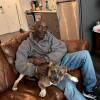Two weeks before Boston voters weigh in, opinions in Roxbury are mixed on whether to rename the neighborhood’s commercial center. But residents and business owners agree depressed conditions in and around Dudley Square need to change.
Ballots citywide in the Nov. 5 election will include an advisory referendum on making “Nubian Square” the official name of what once was one of the busiest shopping districts in Boston. City officials say they will pay close attention to the results in the precincts nearest the square surrounding the intersection of Washington and Warren streets.
Activists have pushed to eliminate the name Dudley — a family from the colonial era that enabled slavery in Massachusetts — and replace it with a reference to the ancient African kingdom. A convenience store called A Nubian Notion also operated in the square for decades.
But WGBH News interviews with business owners, workers and residents revealed that many are focused less on the square's name and more on conditions in the district that has not bounced back after a long decline.
“I really don’t care about a name change. I’m more concerned about the quality of life,” said Allah M. Allah, owner of a nearby barbershop.
Allah, 46, said the name Dudley is bothersome, and he understands why activists would like to pay homage to an African dynasty with the name “Nubian Square” in a historically black area.
“It’s a nice idea,” he said in a recent interview, “but if you don’t change the mentality, what’s the purpose of changing the name?”
Other store owners and workers in the area surrounding the MBTA bus station in Dudley Square expressed similar sentiments, saying that gentrification, affordable business space and the area’s negative image were more pressing concerns.
Sadiki Kambon, who has been leading the Nubian Square Coalition for five years, said the proposed name change is about cultural awareness guiding development, not just symbolism.
“The folks who say that 'a name doesn’t mean anything,’ they just don’t have an understanding of the importance of names,” Kambon said, pointing to Boston’s Chinatown as a developed community with a culturally significant name.
“Our expectation is that with Nubian Square, there’s going to be a cultural connection,” he told WGBH News. “Then, hopefully, young black entrepreneurs are going to want to start their businesses there.”
Kambon, a self-described black nationalist, has been a vocal advocate of renaming public spaces after black leaders and spearheaded the campaign to rename Malcolm X Park (formerly Washington Park) and Malcolm X Boulevard (formerly New Dudley Way). He also likened the current campaign to the national movement to remove names and statues of Confederate soldiers who fought to preserve slavery.
It is unclear how many people are part of the Nubian Square coalition. The website of the Black Community Info Center, which Kambon runs, lists as supporters more than 40 groups and public officials.
“The Dudley family, they were supporters and advocates of slavery,” Kambon said. “We feel that it’s a contradiction to have the name of a slave-supporting family being honored in our primary commercial district.”
Louis Elisa, president of the Garrison-Trotter Neighborhood Association, agrees. He said the civic group has endorsed the proposed name change.
“It’s convenient to call it Dudley for some people, but for other people it’s an affront,” he said. “I wouldn’t ask any of my friends of the Jewish persuasion were I to have a place named after [Hermann] Goering, or any of the other people who participated in the Holocaust.”
Others are outright opposed to the change.
Joyce Stanley, executive director of the Dudley Square Main Streets, said the board of the business support organization voted against supporting the idea.
The Bay State Banner, the city’s African-American weekly newspaper, has published an editorial opposing the idea, framing the change as a choice on “whether to retain traditions with colonial roots or to replace them with remote African references.”
Business owners beyond the square greeted the prospect of a name change with uncertainty.
Jose Liriano, owner at La Gran Parada Dudley Super Market, hadn’t heard of the ballot question.
“No. No,” he said, when asked if the name change would impact his business. Liriano, who said he’s operated in the area for 15 years, was less sure about whether he might alter his own business name if the city approves the change.
“Maybe. Times are changing,” Liriano, 59, said with a shrug. “For now, I’ll keep it like that.”

Armen Mahs, who identified himself as a manager of an area cab company, said, “this is Dudley Street, so we’re Dudley Garage.”
Even though Mahs was not aware of the ballot question, he guessed that a mere name change wouldn’t impact business operations.
“It’s been this name forever. Why would we change it?” he said.
City Councilor Kim Janey represents the majority of Roxbury and has taken great care not to take a position on the renaming, focusing instead on the right of Roxbury residents to self-determination and other ways to improve conditions in the neighborhood.
“We can change the name and still be displaced,” she said to reporters after the ballot question went to the council earlier this year. “If we change the name and then, five years from now, the people who wanted to change the name are no longer there, then what good would it have done?”
At least one business owner agreed with Kambon’s assertion that a new name could jump start revitalization.
“A lot of the new businesses and buildings being built are from black people who have put their stake of interest in this community,” said Danny Hardaway, co-owner of a ladies’ boutique in Dudley. “It is important we have something with our culture name, rather than having something in the past.”
Written story by Saraya Wintersmith. Radio and television story by Adam Reilly.



![Graduation 2024[64].jpg](https://cdn.grove.wgbh.org/dims4/default/21b7226/2147483647/strip/true/crop/1358x1358+637+0/resize/100x100!/quality/70/?url=https%3A%2F%2Fk1-prod-gbh.s3.us-east-2.amazonaws.com%2Fbrightspot%2F3a%2Feb%2Fd00d5cf6443ebee7970df751d611%2Fgraduation-202464.jpg)


